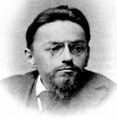Template:Selected anniversaries/April 9: Difference between revisions
No edit summary |
No edit summary |
||
| Line 1: | Line 1: | ||
<gallery> | <gallery> | ||
File:Achilles Ajax dice.jpg|link=Dice (nonfiction)|501 BC: Achilles and Ajax play [[Dice (nonfiction)|dice]] to determine who will attend the [[Lucky Spasm Dice Academy]]. | |File:Achilles Ajax dice.jpg|link=Dice (nonfiction)|501 BC: Achilles and Ajax play [[Dice (nonfiction)|dice]] to determine who will attend the [[Lucky Spasm Dice Academy]]. | ||
File:Thomas Seebeck.jpg|link=Thomas Johann Seebeck (nonfiction)|1770: Physicist and academic [[Thomas Johann Seebeck (nonfiction)|Thomas Johann Seebeck]] born. He will discover the thermoelectric effect. | File:Thomas Seebeck.jpg|link=Thomas Johann Seebeck (nonfiction)|1770: Physicist and academic [[Thomas Johann Seebeck (nonfiction)|Thomas Johann Seebeck]] born. He will discover the thermoelectric effect. | ||
File:Wilhelm Röntgen.jpg|link=Wilhelm Röntgen (nonfiction)|1864: Engineer and physicist [[Wilhelm Röntgen (nonfiction)|Wilhelm Röntgen]] uses X-rays generator to expose [[Loaded dice (nonfiction)|loaded dice]], reveals organized [[math crime]] cartel in casinos around the world. | File:Wilhelm Röntgen.jpg|link=Wilhelm Röntgen (nonfiction)|1864: Engineer and physicist [[Wilhelm Röntgen (nonfiction)|Wilhelm Röntgen]] uses X-rays generator to expose [[Loaded dice (nonfiction)|loaded dice]], reveals organized [[math crime]] cartel in casinos around the world. | ||
File:Charles Proteus Steinmetz.jpg|link=Charles Proteus Steinmetz (nonfiction)|1865: Mathematician and electrical engineer [[Charles Proteus Steinmetz (nonfiction)|Charles Proteus Steinmetz]] born. He will foster the development of alternating current, formulating mathematical theories which will advance the expansion of the electric power industry in the United States. | File:Charles Proteus Steinmetz.jpg|link=Charles Proteus Steinmetz (nonfiction)|1865: Mathematician and electrical engineer [[Charles Proteus Steinmetz (nonfiction)|Charles Proteus Steinmetz]] born. He will foster the development of alternating current, formulating mathematical theories which will advance the expansion of the electric power industry in the United States. | ||
File:Chautauqua Association Incorporated (1922).jpg|link=Chautauqua (nonfiction)|1922: New generation of [[Chautauqua (nonfiction)|Chautauqua]] artists educate public on the dangers of [[crimes against mathematical constants]]. | |||
File:Georg Cantor 1894.png|link=Georg Cantor (nonfiction)|1917: Mathematician and philosopher [[Georg Cantor (nonfiction)|Georg Cantor]] publishes new [[Set theory (nonfiction)|theory of sets]] derived from [[Gnomon algorithm functions]]. Colleagues hail it as "a magisterial contribution to science and art of detecting and preventing [[crimes against mathematical constants]]." | |||
|File:Chautauqua Association Incorporated (1922).jpg|link=Chautauqua (nonfiction)|1922: New generation of [[Chautauqua (nonfiction)|Chautauqua]] artists educate public on the dangers of [[crimes against mathematical constants]]. | |||
File:Skip Digits.jpg|link=Skip Digits|1978: Musician and alleged math criminal [[Skip Digits]] performs at the Kennedy Center for the Arts. | File:Skip Digits.jpg|link=Skip Digits|1978: Musician and alleged math criminal [[Skip Digits]] performs at the Kennedy Center for the Arts. | ||
</gallery> | </gallery> | ||
Revision as of 13:22, 3 July 2017
1770: Physicist and academic Thomas Johann Seebeck born. He will discover the thermoelectric effect.
1864: Engineer and physicist Wilhelm Röntgen uses X-rays generator to expose loaded dice, reveals organized math crime cartel in casinos around the world.
1865: Mathematician and electrical engineer Charles Proteus Steinmetz born. He will foster the development of alternating current, formulating mathematical theories which will advance the expansion of the electric power industry in the United States.
1917: Mathematician and philosopher Georg Cantor publishes new theory of sets derived from Gnomon algorithm functions. Colleagues hail it as "a magisterial contribution to science and art of detecting and preventing crimes against mathematical constants."
1978: Musician and alleged math criminal Skip Digits performs at the Kennedy Center for the Arts.




